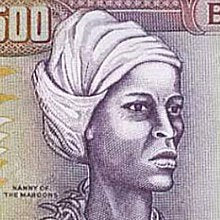Queen Nanny of the Maroons; A Jamaican Heroine
Queen Nanny, also known by several nicknames such as Granny Nanny or Nanny of the Maroons, was an influential leader in Jamaica's 18th-century history. She led a community of previously enslaved Africans known as the Windward Maroons in effective guerilla warfare against British colonial forces. This rebellion became recognized as the First Maroon War. The scarcity of textual records about Queen Nanny means much of our knowledge stems from oral history and Maroon legends.
Origins of Queen Nanny
Oral tradition asserts that Queen Nanny was born into the Akan people, who now inhabit the Blue Mountains in Jamaica. However, Queen Nanny may either have been born in West Africa or descended from African royals betrayed by the Spaniards in 1642 and sold into Jamaican slavery. Maroon stories suggest Nanny arrived in Jamaica as a slave and later escaped, whereas another tale posits she always remained free while in Jamaica. Furthermore, certain versions of her life argue she was of royal African blood and lived as a free woman in Jamaica, possibly with her own serfs and family.
According to Maroon legend, a certain Maroon named Swipplemento, who later became known as Rose Harris, or Pa Ro, married Nanny or Ma Ro, bearing three children together. However, evidence for this tale is sparse.
The Jamaican Maroons
The Maroons primarily descend from the West African Akan people, known as formidable fighters. Other enslaved Africans who escaped the harsh plantation life joined Maroon communities located in Jamaica's mountains or native islanders in the Blue Mountains, contributing to the varied origins of Maroons. While many declared themselves free after escaping Spanish-owned plantations when the British captured Jamaica in 1655, others argue that Queen Nanny's Maroons were present in Jamaica's Blue Mountains before the Spanish arrived.
Nanny's Leadership and Role in Maroon Warfare
Under Nanny's leadership, the Windward Maroons accomplished considerable victories against the British. These victories are attributed both to supernatural powers Nanny purportedly possessed and to the Maroon's combat expertise. Unable to achieve victory in open warfare, the British consequently sought peace, culminating in a treaty signed on 20 April 1740. This historic treaty ensured state-sanctioned freedom for Maroons and presented Nanny and her followers with 500 acres of land, eventually becoming the town of Moore Town, or New Nanny Town. Today, Moore Town inhabitants commemorate 20 April 1740 as a public holiday.
Legacy of Queen Nanny
Despite the sparsity of written records, Queen Nanny's impact as a leader and a symbol of freedom is unquestionable. The Jamaican government recognized her leadership and contribution to Jamaican culture, designating her their single female national hero in 1975. In everyday Jamaican life, Queen Nanny's legacy is also evident. She is pictured on the Jamaican $500 note, which is colloquially called a "Nanny."
Queen Nanny was an extraordinary figure who led a community of formerly enslaved Africans to freedom. Her leadership and influence during the Maroon War have left an indelible mark on Jamaican history and culture. Today, Queen Nanny's legacy as a liberator and national heroine continues to inspire Jamaicans and reflects the nation's spirit of resilience and resistance. Queen Nanny’s story is a testament to fighting for freedom and a shining example of leadership in adversity.


